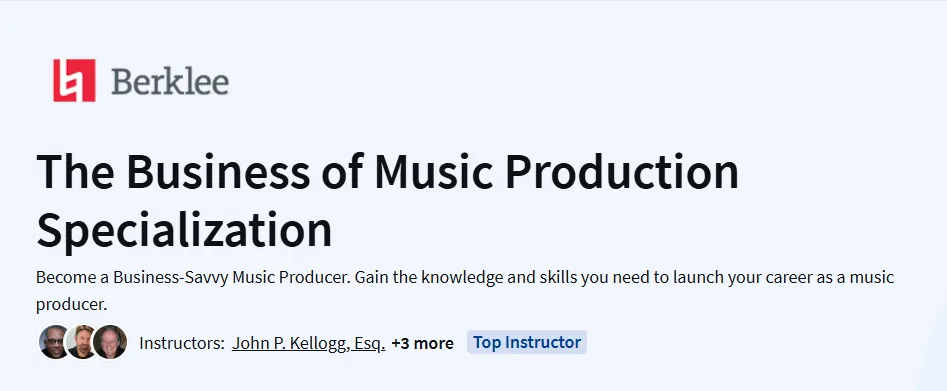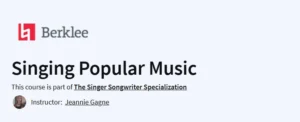What you will learn in The Business of Music Production Specialization Course
- Music production budgeting and scheduling
- Intellectual property rights management
- Artist-producer contracts and negotiations
- Studio business models and revenue streams
- Marketing strategies for producers
- Royalty collection systems
- Emerging industry trends (NFTs, streaming)
Program Overview
Music Business Foundations
⏱️ 4 weeks
- Covers copyright laws, publishing administration, and PROs (ASCAP/BMI).
- Includes case studies of successful producer deals.
Financial Management
⏱️ 4 weeks
- Focuses on production budgets, cash flow analysis, and tax considerations.
- Features royalty calculation exercises.
Artist Relations
⏱️ 4 weeks
- Examines contract clauses, collaboration agreements, and conflict resolution.
- Includes negotiation role-plays.
Marketing & Branding
⏱️ 4 weeks
- Teaches social media strategies, producer branding, and sync licensing.
- Features pitch deck development.
Capstone Project
⏱️ 4 weeks
- Students create a comprehensive business plan for a production company or project.
Get certificate
Job Outlook
- Professional value: Essential for music entrepreneurs
- Salary potential: 50K250K for established producers
- Industry demand: 10% growth for music professionals
- Certification benefit: Berklee alumni network access
Explore More Learning Paths
Expand your expertise in music production, combining creative, technical, and business skills to build a successful career in the modern music industry.
Related Courses
The Art of Vocal Production Course – Master the techniques of recording, editing, and producing professional-quality vocals to enhance your music projects.
The Technology of Music Production Course – Dive deeper into the tools, software, and workflows that power modern music production.
Electronic Music Production Specialization Course – Develop skills in electronic music creation, sound design, and digital production techniques for professional-grade outputs.
Related Reading
Support your growth with structured strategies for creative and professional success:
What Is Performance Management? – Explore how goal-setting, evaluation, and continuous improvement frameworks can enhance your productivity and output as a music producer.
Specification: The Business of Music Production Specialization Course
|
FAQs
- Budgeting & Scheduling: How to plan production projects with practical budgeting and scheduling skills.
- Intellectual Property Rights: Navigate copyright, publishing administration, and royalty systems to protect your creative work.
- Artist–Producer Agreements: Understand contract negotiations, collaboration agreements, and how to formalize professional relationships.
- Studio Business Models: Explore different revenue streams—like sync licensing, NFTs, streaming—and how studios can operate sustainably.
- Marketing for Producers: Learn branding, social media strategies, and how to pitch yourself effectively in the music market.
- Composed of four main courses, each lasting 4 weeks:
- Music Business Foundations
- The Art of Music Production
- Copyright Law in the Music Business
- Pro Tools Basics
(Additionally, the course overview from Course.Careers lists slightly different modules but follows a similar flow.) - Capstone Project (4 weeks): Develop a full business plan for a production company or music project.
- Total duration is approximately 4 months, typically at 3 hours per week—or about 48–60 hours overall.
- The specialization is self-paced, with lifetime access to all course materials.
- No prior business experience is required; it’s labeled Beginner level.
- No formal prerequisites—course is labeled Beginner level, welcoming for newcomers.
- A basic familiarity with music production tools like Pro Tools could be helpful but not strictly necessary.
- The focus is less on technical production and more on music business, legal frameworks, and marketing strategies.
- If you’re already managing creative work, this will help you transform it into a viable business.
- Some platforms note that a bit of musical background helps—but it remains accessible even for those new to the production landscape.
- Offered through Coursera in collaboration with Berklee College of Music, one of the most reputable institutions in music education.
- Students gain access to the broader Berklee alumni network, enhancing professional visibility.
- The specialization features real-world case studies, downloadable templates (e.g., contracts), and globally relevant content like royalty systems and NFT trends.
- Rated highly by course review aggregators—highlighted as a top-tier toolkit for music entrepreneurs.
- Practical, business-focused, and designed by industry experts to bridge creative and commercial aspects of music production.
- Yes—you’ll receive a Certificate of Completion upon successful submission of all modules and the capstone.
- Audit access is likely available, allowing you to explore most content for free without certification—verification needed per Coursera’s policies.
- Financial aid options and the standard 7-day free trial may be available to reduce cost barriers.
- Certificate adds credibility—useful if you’re looking to enter music entrepreneurship or partner with business entities.
- Flexibility and lifetime access mean you can learn at your own pace and revisit resources anytime.





